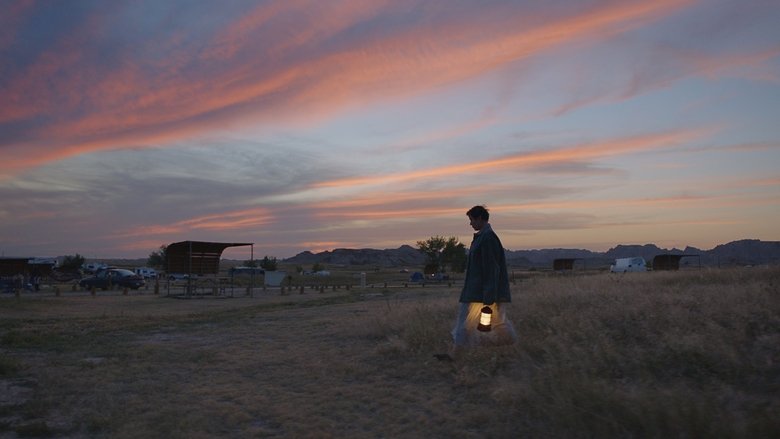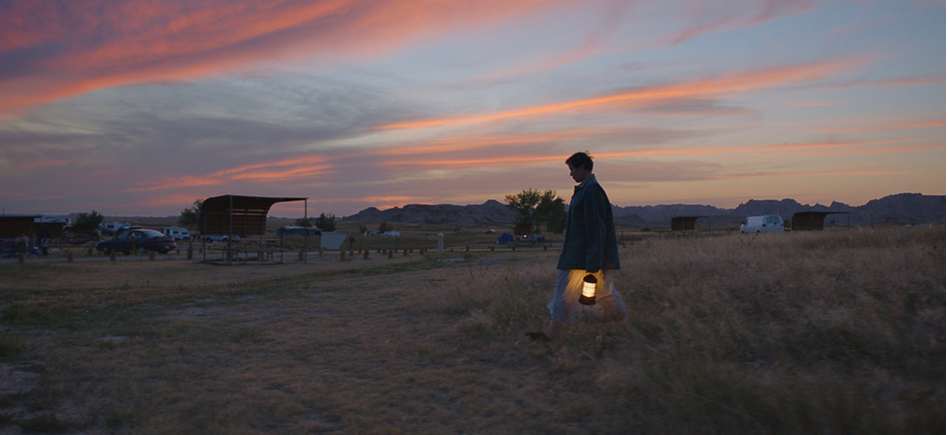← Back to Reviews

in
Nomadland
Two-time Oscar winner Frances McDormand should be in serious consideration for a third Best Actress statuette as the centerpiece of an achingly real, harrowing, and squirm-worthy drama called Nomadland that takes an up close, often too up close, look at a forgotten aspect of American society that this reviewer doesn't recall ever being addressed onscreen before.

The 2020 film opens by informing us that, in 2011, a factory in Empire, Nevada went out of business and crippled the town to the point that their zip code was eliminated. We are then introduced to a widow named Fern, played by McDormand, an assembly line worker for Amazon whose life was so severely damaged by the death of her husband and the closing of the factory, that she is now reduced to living in her van, becoming what is known as a nomad, a person who doesn't have a permanent residence and is forced to live in her vehicle.

Director, screenwriter, and film editor Chloe Zhao has crafted an intimate and deeply personal look at a lifestyle that most of us have not really seen before. The plight of the homeless has been addressed in film, both in comedic and dramatic veins, but this is a different kind of homelessness that has its own set of challenges, in addition to what the homeless on the street go through. Yes, they have shelter but their shelter is on wheels and it's often a problem to find a place to park a van for any serious length of time without being bothered. There's a frighteningly realistic moment in the film where Fern is sitting in her van parked near a gas station, enjoying a piece of fried chicken, like it's a seven course meal and someone bangs on her window, telling her she can't park there. The look on Fern's face is sheer terror as she would prefer to die than to actually communicate with the person banging on her window.

Zhao's screenplay eventually finds its way to a theory that the nomad lifestyle has its basis in different forms of grief and loss where often the only solace is isolation. We get brief glimpses into Fern's backstory that come full circle when Fern makes contact with her sister, whose offer to let Fern move in with her is politely refused. There's a great moment of outrage from Fern when her brother-in-law refers to here lifestyle as "chucking it all and hitting the road." Serious drama is also provided when Fern discovers her van is breaking down, which we forget as normal homeowners, would be comparable to our house burning down.

We get other serious doses of reality when we see Fern having to find a place to urinate or when she has to battle with a fellow nomad over a can opener, which we learn is life's blood for a nomad. There's a beautifully edited scene where Fern disappears from a tour because she has to go to the bathroom and gets caught before she does. The moment when she has to admit to an auto mechanic that she lives in her van, the only time she says it out loud during the running time, is heartbreaking.

This surprising look at a subculture we know so little about is gorgeously photographed, featuring Oscar-worthy cinematography and a lovely, but minimalistic music score that fills moments that need to be filled and disappears when not needed. Frances McDormand's beautifully understated performance in the title role could well earn a third Oscar and Zhao really scores by having several real-life nomads inhabit the story, making the film experience even richer. A simultaneously harrowing and hopeful motion picture experience that haunts long after the credits.
Two-time Oscar winner Frances McDormand should be in serious consideration for a third Best Actress statuette as the centerpiece of an achingly real, harrowing, and squirm-worthy drama called Nomadland that takes an up close, often too up close, look at a forgotten aspect of American society that this reviewer doesn't recall ever being addressed onscreen before.

The 2020 film opens by informing us that, in 2011, a factory in Empire, Nevada went out of business and crippled the town to the point that their zip code was eliminated. We are then introduced to a widow named Fern, played by McDormand, an assembly line worker for Amazon whose life was so severely damaged by the death of her husband and the closing of the factory, that she is now reduced to living in her van, becoming what is known as a nomad, a person who doesn't have a permanent residence and is forced to live in her vehicle.

Director, screenwriter, and film editor Chloe Zhao has crafted an intimate and deeply personal look at a lifestyle that most of us have not really seen before. The plight of the homeless has been addressed in film, both in comedic and dramatic veins, but this is a different kind of homelessness that has its own set of challenges, in addition to what the homeless on the street go through. Yes, they have shelter but their shelter is on wheels and it's often a problem to find a place to park a van for any serious length of time without being bothered. There's a frighteningly realistic moment in the film where Fern is sitting in her van parked near a gas station, enjoying a piece of fried chicken, like it's a seven course meal and someone bangs on her window, telling her she can't park there. The look on Fern's face is sheer terror as she would prefer to die than to actually communicate with the person banging on her window.

Zhao's screenplay eventually finds its way to a theory that the nomad lifestyle has its basis in different forms of grief and loss where often the only solace is isolation. We get brief glimpses into Fern's backstory that come full circle when Fern makes contact with her sister, whose offer to let Fern move in with her is politely refused. There's a great moment of outrage from Fern when her brother-in-law refers to here lifestyle as "chucking it all and hitting the road." Serious drama is also provided when Fern discovers her van is breaking down, which we forget as normal homeowners, would be comparable to our house burning down.

We get other serious doses of reality when we see Fern having to find a place to urinate or when she has to battle with a fellow nomad over a can opener, which we learn is life's blood for a nomad. There's a beautifully edited scene where Fern disappears from a tour because she has to go to the bathroom and gets caught before she does. The moment when she has to admit to an auto mechanic that she lives in her van, the only time she says it out loud during the running time, is heartbreaking.

This surprising look at a subculture we know so little about is gorgeously photographed, featuring Oscar-worthy cinematography and a lovely, but minimalistic music score that fills moments that need to be filled and disappears when not needed. Frances McDormand's beautifully understated performance in the title role could well earn a third Oscar and Zhao really scores by having several real-life nomads inhabit the story, making the film experience even richer. A simultaneously harrowing and hopeful motion picture experience that haunts long after the credits.
